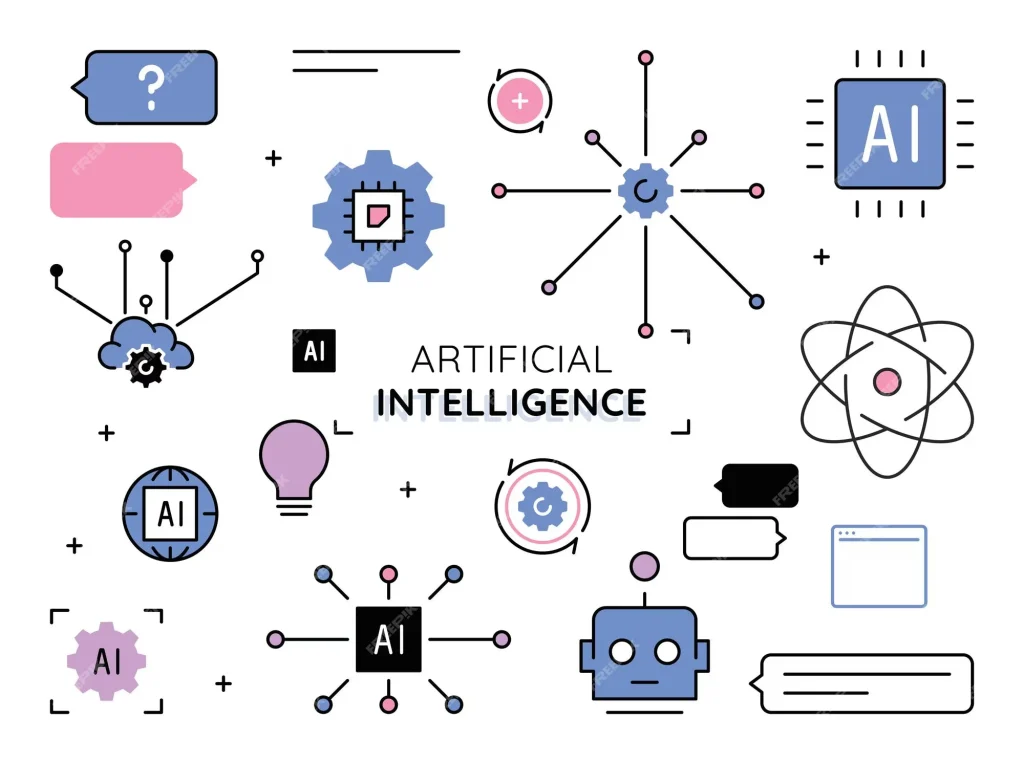Introduction
The year 2025 is set to be a revolutionary period for artificial intelligence (AI) and machine learning (ML). With rapid technological advancements, AI is becoming more sophisticated, efficient, and integrated into various industries. From AI-driven automation to ethical considerations, this article will explore the AI and Machine Learning Trends 2025, highlighting key AI advancements, machine learning predictions, and top AI technologies that will shape the future.

AI Advancements and Machine Learning Predictions for 2025
Emerging AI Techniques Shaping the Future
AI techniques are evolving rapidly, pushing the boundaries of what machines can achieve. In 2025, new AI models will focus on improving efficiency, accuracy, and decision-making capabilities. Self-learning algorithms, AI-powered code generation, and natural language understanding will transform industries. The ability of AI to process vast amounts of data and generate human-like responses is improving, making it more reliable and adaptable. Expect AI models like Open AI, Deep Seek to be more transparent, interpretable, and aligned with ethical guidelines, ensuring responsible development and deployment.
Engineers and tech people are using these tools to shape the bright future of humanity. Before deep seek people used Open AI, Top AI technologies. After all the hard work many other AI Advancements had came. In future by the help of AI, we can make the most powerful computer of mankind easy and usable for everyone. It is the future.
Quantum Computing AI Applications
Quantum computing will significantly impact AI in 2025 by enabling faster computations and solving complex problems that classical computers struggle with. AI algorithms will leverage quantum mechanics to optimize logistics, cryptography, and large-scale simulations. Companies investing in quantum AI research will gain a competitive edge, as this technology will allow them to process and analyze data at unprecedented speeds. As quantum computers become more accessible, expect to see breakthroughs in AI models, enabling industries to make more accurate predictions and decisions.
AI in Real-Time Data Processing and Automation
AI-powered real-time data processing will be essential for businesses and industries looking to make instant decisions. AI-driven automation in manufacturing, customer service, and cybersecurity will enhance productivity and efficiency. AI will process vast amounts of data in real time, helping businesses optimize operations, reduce costs, and improve customer experiences. AI-driven automation in 2025 will also minimize human intervention in repetitive tasks, allowing professionals to focus on more strategic and creative aspects of their work.
Top AI Technologies and Use Cases in 2025
AI-Powered Code Generation and Software Development
AI is transforming software development by automating code generation and testing. AI-powered tools will assist developers in writing, debugging, and optimizing code, reducing development time and errors. In 2025, AI-driven software development will be more efficient, making it easier for businesses to build robust applications. Expect AI-powered code assistants to become more intelligent, providing real-time suggestions and automating repetitive coding tasks. This will allow developers to focus on innovation rather than troubleshooting errors.
AI-Driven Personalization and Customer Experience
AI will redefine personalization in 2025 by tailoring content, products, and services to individual users. AI-powered recommendation engines will analyze customer behavior and preferences to provide highly relevant suggestions. Businesses will leverage AI-driven personalization to enhance customer engagement, retention, and satisfaction. AI will also improve chatbot interactions, making them more human-like and capable of handling complex customer queries efficiently. The integration of AI in marketing and e-commerce will drive higher conversion rates and improve user experiences.
AI Integration in Hybrid Cloud and Edge Computing
In 2025, AI will be deeply integrated into hybrid cloud and edge computing environments. This integration will allow businesses to process data faster while reducing latency and improving security. AI-driven edge computing will be essential for industries such as healthcare, finance, and IoT, where real-time processing is critical. Hybrid cloud solutions will leverage AI to optimize workloads, enhance cybersecurity, and improve scalability. As more businesses adopt AI-powered cloud solutions, expect to see increased efficiency, cost savings, and improved data security.
AI-Driven Innovations and Industry Integration in 2025
AI in Healthcare – Predictive Diagnostics & Treatment
AI will play a critical role in healthcare by enabling predictive diagnostics, personalized treatment plans, and automated medical imaging analysis. AI-powered tools will help doctors identify diseases at early stages, improving patient outcomes. AI-driven drug discovery and robotic surgeries will revolutionize the healthcare industry, making treatments more precise and accessible. By leveraging AI, healthcare providers will enhance efficiency, reduce costs, and offer better patient care.
AI in Finance – Fraud Detection & Risk Management
The finance industry will benefit from AI’s ability to detect fraudulent activities and manage risks effectively. AI-powered algorithms will analyze financial transactions in real time, identifying suspicious activities and preventing fraud. AI-driven investment strategies will help businesses make informed decisions based on market trends and data analysis. AI will also enhance customer support in banking by providing instant assistance through chatbots and virtual assistants, improving overall customer experience.
AI for Cybersecurity – Next-Gen Threat Detection
With increasing cyber threats, AI will be a crucial tool for cybersecurity in 2025. AI-driven security systems will detect and respond to cyber threats in real time, minimizing risks and data breaches. AI will analyze patterns of cyberattacks, predict vulnerabilities, and automatically implement security measures. Businesses will use AI to strengthen their cybersecurity infrastructure, ensuring data protection and compliance with regulations.
Machine Learning Tools, Frameworks, and Applications
Top Machine Learning Frameworks to Watch
Machine learning frameworks like TensorFlow, PyTorch, and Scikit-learn will continue to dominate in 2025. These frameworks will evolve with better optimization techniques, making it easier for developers to build, train, and deploy AI models. New machine learning tools will focus on improving model interpretability and reducing bias, ensuring ethical AI development.
Machine Learning for Data Analysis and Decision Making
Machine learning will be essential for data analysis in 2025, helping businesses derive insights from large datasets. AI-powered analytics tools will automate data processing, enabling organizations to make data-driven decisions quickly. ML models will enhance forecasting, trend analysis, and customer behavior predictions, making businesses more competitive and agile.
Low-Code/No-Code AI Platforms for Businesses
Low-code and no-code AI platforms will empower businesses to implement AI solutions without requiring extensive programming knowledge. These platforms will enable small and medium-sized enterprises (SMEs) to leverage AI for automation, customer engagement, and data analytics. By simplifying AI adoption, businesses can enhance efficiency and innovation with minimal technical expertise.
Ethical Considerations and AI’s Societal Impact
AI Ethics in Development and Implementation
AI ethics will be a crucial focus in 2025, ensuring that AI technologies are developed and used responsibly. Companies will need to address issues like bias, transparency, and accountability in AI systems. Ethical AI frameworks will guide the development and deployment of AI solutions, ensuring fairness and reducing unintended consequences.
Data Privacy Regulations and Compliance Challenges
As AI adoption grows, data privacy regulations will become more stringent. Businesses will need to comply with laws like GDPR and other regional regulations to protect user data. AI-driven data privacy solutions will help companies manage and secure customer information while maintaining compliance with global standards.
The Role of AI-Powered Testing in Ensuring Fairness
AI-powered testing frameworks will be essential for evaluating AI models’ fairness and accuracy. These tools will identify biases and ensure AI systems provide equitable outcomes. Businesses and developers will prioritize AI fairness testing to maintain trust and transparency in AI applications. But now AI still developing. Most of the basis, AI making the answer from human help. In future AI should give answer from its own thinking.
Conclusion
The future of AI and machine learning in 2025 looks promising, with groundbreaking advancements, ethical considerations, and increased industry integration. As AI continues to evolve, businesses and individuals must stay informed and adapt to these changes. AI-driven automation, cybersecurity, and personalized experiences will shape the digital landscape, making AI an indispensable tool in various sectors. Ready to make your AI, Contact Us here
Check Our Socials:
FAQs
- 1. How will AI impact businesses in 2025?
AI will enhance automation, improve customer experiences, and optimize operations across various industries, making businesses more efficient and competitive. - 2. What are the top AI technologies to watch in 2025?
Key AI technologies include quantum AI, edge computing, AI-powered automation, and advanced machine learning frameworks. - 3. Will AI replace human jobs in 2025?
AI will automate repetitive tasks, but human workers will still be needed for strategic decision-making, creativity, and ethical oversight. - 4. How will AI improve cybersecurity in 2025?
AI-driven security systems will detect threats in real time, predict vulnerabilities, and strengthen data protection measures. - 5. What industries will benefit the most from AI in 2025?
Healthcare, finance, cybersecurity, and e-commerce are expected to see significant AI-driven transformations in 2025.
